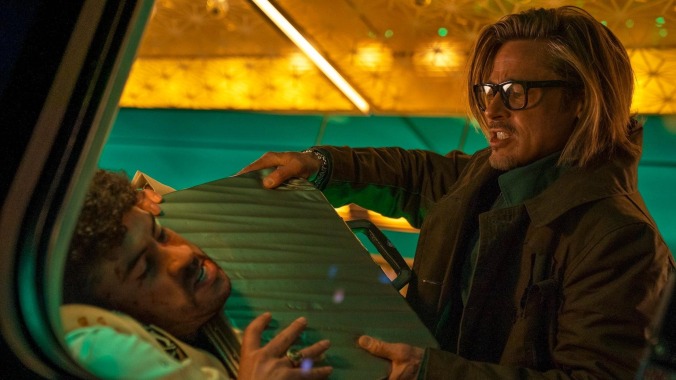Bullet Train takes Brad Pitt for a ride before it goes off the rails
Director David Leitch has designs on Quentin Tarantino and Guy Ritchie, but his assassin thriller falls well short

A constant social media refrain asks if certain older movies could still be made today based on elements like cost, logistics, politically incorrect content, or a filmmaker’s formula-defying creative process. Bullet Train begs the question of whether movies inspired by those filmmakers should even be attempted today, unless they’re being done by the original directors themselves.
Bullet Train filmmaker David Leitch may fancy himself a spiritual descendant of Quentin Tarantino and Guy Ritchie, who established their distinctive styles decades before Kōtarō Isaka’s acclaimed novel of the same name was published in 2010. But Leitch’s talky, violent hit man movie, with Brad Pitt at the center of an over-cranked ensemble cast, reminds us why Hollywood has all but abandoned attempts to copy the successes of Tarantino and Ritchie. This film is not just bloated, tedious, dim-witted, and glib, it’s also redundant.
Pitt plays “Ladybug,” a former hitman hired by his longtime handler Maria (Sandra Bullock, returning a favor after Pitt’s appearance in The Lost City) to steal a briefcase full of cash from active hitmen Tangerine (Aaron Taylor-Johnson) and Lemon (Brian Tyree Henry). Despite Maria’s assurances about the simplicity of the job, Ladybug quickly encounters opposition not only from Tangerine and the Thomas The Tank Engine-obsessed Lemon, but also The Prince (Joey King), a conniving Brit posing as a schoolgirl; Yuichi Kimura (Andrew Koji), an anguished Japanese father seeking vengeance after his son was pushed off of a roof; Hornet (Zazie Beetz), an assassin with her own designs on the briefcase, and other targets to execute; and The Wolf (Benito A Martinez Ocasio aka Bad Bunny), a Mexican cartel member who came to Japan after the death of his wife, for which he blames the luckless Ladybug.
Ladybug must not only defeat these foes, but figure out what events put all of them in his path. This leads to a variety of flashbacks, subplots, surprises, and secret motives, which Leitch and screenwriter Zak Olkewicz (Fear Street: Part Two—1978) shuffle with little regard for pacing or the basic logistics of the film’s setting: how long exactly does it take for a high-speed train to travel from Tokyo to Kyoto (it was Morioka in Isaka’s novel)? A quick Google search indicates that the trip lasts about two hours and 15 minutes, but for some reason, this train runs all night—making Ladybug’s escalating gauntlet feel more like a meandering travelogue through the characters’ one-dimensional personalities.
The muscular, charming energy that Leitch brought to set pieces and fight sequences in Hobbs & Shaw extends past the tipping point of improbability here, with a train that’s full of passengers at times and empty others, without any real explanation. There are stabbings, poisonings, gunshots, snake attacks, hand-broken windshields, explosions, derailings, and more, and the only person who seems to notice is a little old lady who wishes Ladybug and Lemon would be quieter while they beat each other senseless.
As a conflict-averse assassin, Ladybug’s efforts to resolve each new confrontation runs out of gas, especially since Pitt has played some version of a capable dope with more words than brains since at least The Mexican. Watching the actor have fun on screen should actually be fun, but here it feels like he’s dragging the train along, instead of effortlessly riding it. Meanwhile as Lemon, Henry’s obsession with Thomas & Friends is like a remnant of the era in which Tarantino spiced up Crimson Tide with monologues about the Silver Surfer. And the result here is just as obnoxious as it was watching Tarantino rant about Top Gun when he appeared in Sleep With Me. And even though Taylor-Johnson tapped into a surprisingly appealing persona when he adopted a working-class Cockney accent for a supporting role in Christopher Nolan’s Tenet, he repeats himself here and reduces his charm to sub-Guy Ritchie levels.
The less said about the rest of the cast the better, although Koji and the always stellar Hiroyuki Sanada desperately fight to inject dignity into the story of their family’s multi-generational betrayals and misjudgments. But Leitch and Olkewicz feebly draw out those themes across the myriad conflicts and saddle these performers with those topics in an act of misjudged authenticity. Controversies over a mostly English-language adaptation of a Japanese novel notwithstanding—which Isaka himself has largely dismissed—what proves to be more offensive is the film’s unskilled attempt to inject seriousness into what should have been a cheeky summer distraction. It’s fine for a movie about a bunch of competing killers to itself place no value on human life, and even to joyfully indulge in that kind of nihilism, but the way the filmmakers inject a sense of pathos feels about as earnest and meaningful as an airport gift shop souvenir before the flight home from some far-flung foreign country.
That said, whether or not Isaka started with an adequate level of originality on the page, this kind of story occupies a place that’s simply too well-defined on screen. Especially when it’s anchored by an equally familiar performance by Pitt, whose movie stardom has been amplified by the talents of filmmakers like Tarantino and Ritchie, but doesn’t always generate enough wattage to juice up a lackluster project on its own.
Ultimately, Bullet Train aims to be slick when it needs to be smart, and predictable when it should be provocative—effectively making all of the wrong stops at exactly the wrong time. The problem isn’t that Leitch doesn’t have the talent to pull off a film like this, but that he doesn’t have the personality. Rather, he possesses the proficiency to be a contemporary studio journeyman—as long as he chooses the right journey.